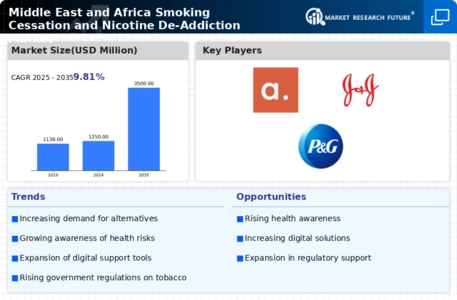Market Analysis
In-depth Analysis of MEA Smoking Cessation Nicotine De-Addiction Market Industry Landscape
The Smoking Cessation and Nicotine De-Addiction market in the Middle East and Africa (MEA) has a very dynamic situation. People of this region are becoming increasingly aware of the health hazards associated with tobacco consumption. The dynamics in this market are controlled by different factors such as changing cultures, policies, and increased prevalence of smoking related diseases. There is an increasing demand for smoking cessation aids as government agencies and health organizations try to combat the tobacco epidemic.
One significant driver of market dynamics in the MEA region is increasing population consciousness about health. This implies that individuals have become more knowledgeable about smoking’s negative effects on their bodies hence they are searching for effective answers or ways to stop using it. This has resulted into high demand for smoking cessation drugs like nicotine replacement therapies, prescription medications, and counseling services among others. Consequently, market players are re-strategizing to cope up with this fast-rising demand while at the same time giving holistic solutions to quitters.
Regulatory initiatives also play a key role in shaping the MEA Smoking Cessation and Nicotine De-Addiction market. Governments within these countries have started implementing stringent regulations so that they can suppress cigarette consumption including putting graphic warnings on cigarette packs, advertising bans, and taxation policies among other actions taken against them. Such actions not only discourage current smokers from further indulging but also create conducive environment for growth of products or services aimed at helping people quit smoking. Market participants are keenly observing regulatory changes with an aim of ensuring compliance within their operations thereby stimulating business growth.
Cultural elements similarly influence development patterns in MEA markets since some societies associate smoking with cultural values which makes it hard to promote abstinence from it. Nonetheless; there has been a gradual shift in attitudes towards smoking due to educational campaigns and awareness programs being carried out across various communities.. In trying to reach out most effectively according to cultural differences, many companies offering nicotine de-addiction products and services have to tailor their marketing messages specifically to show that smoking is bad habit with good solutions.
In the MEA region, the prevalence of smoking-related diseases makes tobacco addiction an urgent problem. Smoking-related illnesses are putting a burden on health care systems thus there is increasing awareness of the economic and social advantages of investing in cessation programs. This realization has stimulated partnerships between healthcare providers, pharmaceutical suppliers, and government agencies in development of comprehensive strategies for tackling tobacco addiction thereby contributing to dynamic market processes.






Leave a Comment